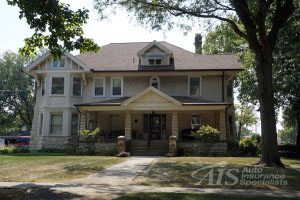Insurance can be a tricky part of life, especially when it comes to your home. This is because there are so many types of houses, and many of them are unique. Luckily, insurance companies know you want to protect one of your most valuable assets in the best way possible. That’s why they offer many different types of coverages you can include on your Homeowners Insurance policy. One of these coverages that you may want to consider if you have an older home is Ordinance or Law Coverage.
Many people wrongly assume that their Homeowners Insurance will cover everything when they make a claim. If you purchased a million-dollar home, then had to rebuild it after a catastrophic loss, you may think your coverage will deliver that same home without any out-of-pocket expenses. However, as with any insurance policy, your payout on a claim depends on many factors. Typically, it will depend on how much coverage you have and what type of situation you’re in.
Let’s say you make a claim to rebuild your home. Basic demolition, remodeling, renovation or repair to the structure are expensive tasks that will most likely be covered by your Homeowners Insurance. That is, if you have the right coverage, particularly Ordinance or Law Coverage.
What Is Ordinance or Law Coverage?
 Ordinance or Law Coverage is an endorsement that takes care of losses that result when rebuilding a home or structure according to current laws or ordinances (city codes). Older homes and buildings are often left off-the-hook in adhering to all city codes. That is, until it comes time to rebuild them. After a fire or natural disaster, your home may be required to update the electrical, heating, ventilation, air-conditioning and plumbing. It’s also common for most cities to require demolition of the entire home or building if it is damaged greatly (50 percent or more is typical). That way it can be completely rebuilt according to current laws. You should also keep in mind that these laws and codes can change annually. Make sure to keep yourself updated on anything that could affect your insurance.
Ordinance or Law Coverage is an endorsement that takes care of losses that result when rebuilding a home or structure according to current laws or ordinances (city codes). Older homes and buildings are often left off-the-hook in adhering to all city codes. That is, until it comes time to rebuild them. After a fire or natural disaster, your home may be required to update the electrical, heating, ventilation, air-conditioning and plumbing. It’s also common for most cities to require demolition of the entire home or building if it is damaged greatly (50 percent or more is typical). That way it can be completely rebuilt according to current laws. You should also keep in mind that these laws and codes can change annually. Make sure to keep yourself updated on anything that could affect your insurance.
Why Do You Need Ordinance or Law Coverage?
The work that goes into a demolition and the hauling required to clear the land take time and money. Most standard Homeowners Insurance policies will not cover the demolition of the remaining portions of the home or structure that are undamaged. But according to the law, even the parts that were left untouched must be torn down. One way to avoid reaching into your pockets or credit line to pay for these damages? Having a sufficient Ordinance or Law Coverage endorsement added to your standard Homeowners Insurance policy in advance.
 When new homeowners purchase their first Homeowners Insurance policy, they are usually looking to save as much as possible, or in other words, spend as little as possible. But what if the unexpected happens? Most people opt only for 10% of Coverage A for Ordinance or Law Coverage on a standard Homeowners Insurance policy. That amount is often insufficient if the work necessary to update and rebuild the house or building is extensive.
When new homeowners purchase their first Homeowners Insurance policy, they are usually looking to save as much as possible, or in other words, spend as little as possible. But what if the unexpected happens? Most people opt only for 10% of Coverage A for Ordinance or Law Coverage on a standard Homeowners Insurance policy. That amount is often insufficient if the work necessary to update and rebuild the house or building is extensive.
In disaster-prone areas, 25% of Coverage A or higher is highly advised. That amount of coverage helps prevent homeowners from being left with an outstanding balance to finish the work of putting their lives back together. To prevent accruing out-of-pocket expenses, consider endorsing Ordinance or Law Coverage on your standard Homeowners policy. Or, at the very least, consider increasing your limits.
AIS Is Here To Help
Our AIS Insurance Specialists are here to help you navigate all of your Homeowners Insurance needs. We can explain the important details with you so you’re financially protected in the event of the unexpected. Preparedness is a sure way to get back on your feet as fast as possible. So is having the right Homeowners Insurance coverage. Interested in learning more about Ordinance or Law Coverage as an endorsement? Call one of our knowledgeable Homeowners Insurance Specialists at (855) 247-5298.
The information in this article is obtained from various sources. This content is offered for educational purposes only and does not represent contractual agreements. It should not replace the advice of a qualified professional. The definitions, terms and coverage in a given policy may be different than those suggested here. Such policy will be governed by the language contained therein, and no warranty or appropriateness for a specific purpose is expressed or implied.

